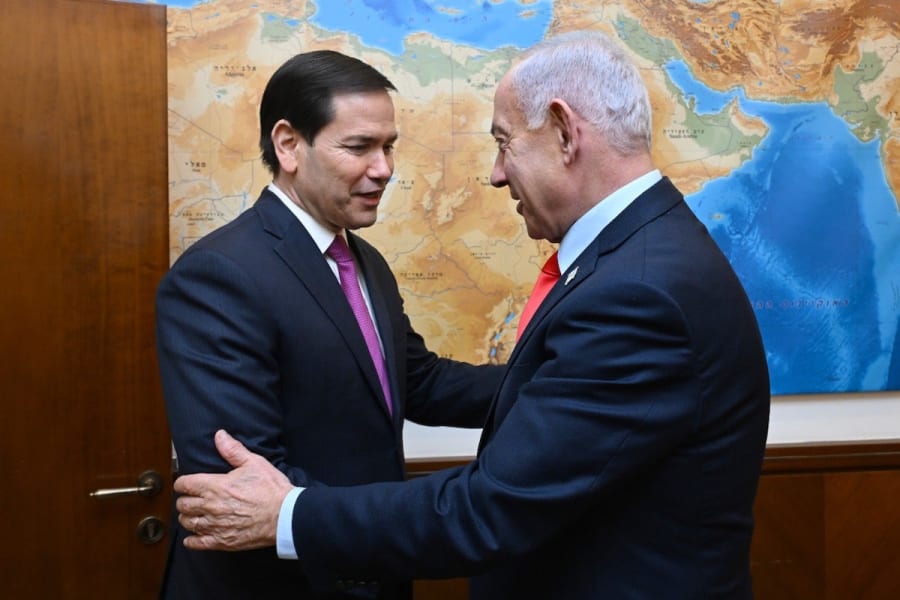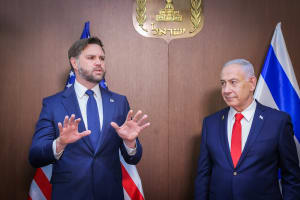US State Secretary Rubio arrives in Israel to advance Trump’s Gaza peace plan amid tensions over Knesset annexation vote

U.S. Secretary of State Marco Rubio arrived in Israel on Thursday to advance President Donald Trump’s Gaza peace plan, as the fragile ceasefire between Israel and Hamas hinges on the deployment of an international peacekeeping force in Gaza.
The composition of this stabilization force is expected to be a central topic in Rubio’s meetings with Prime Minister Benjamin Netanyahu. According to Israeli officials, Jerusalem prefers that friendly nations such as Italy and Germany contribute troops, while opposing participation from France and other countries that recently recognized a “Palestinian state” during last month’s UN General Assembly in New York.
An Israeli government source told reporters that Israel would rather avoid cooperation with nations that “rushed to malign Israel at The Hague,” adding, “It’s not a veto, but it’s our preference.”
Washington’s top diplomat expressed optimism regarding the implementation of the Gaza agreement during a brief press briefing in Israel.
“We’re back here just a little bit over a week after a historic day when President Trump's work, with our partners, led to this extraordinary breakthrough. Now we have more work ahead of us. We feel very positive about it, we're making good progress... no one is under any illusions – we've already done the impossible once, and we intend to keep doing that if we can. We have good partners that we're working with. We feel confident and positive about the progress that's been made, but we're clear-eyed about the challenges too,” Rubio told media representatives.
Netanyahu has also opposed the inclusion of Turkish troops in the international force, citing Ankara’s support for the Hamas terrorist organization and its hostility toward the Jewish state.
Some critics have said that Rubio traveled to Israel – immediately following U.S. Vice President JD Vance's visit – to supervise Netanyahu and the Israeli government’s implementation of the next phase of Trump’s Gaza agreement.
Speaking on condition of anonymity, an Israeli official rejected this notion as “ridiculous” and that it ignores the bigger regional picture.
“It’s not about ‘Bibi-sitting.’ This is a massive undertaking that requires extensive coordination. We’ve never done anything like this – setting up an international military force to stabilize Gaza. It’s a lot of moving parts that need syncing. That’s why they’re here. That’s why [Steve] Witkoff and [Jared] Kushner are hopping between Middle Eastern capitals,” the official explained.
While relations between the Trump administration and Israel are solid, Washington was reportedly disappointed by the Israeli Knesset’s recent symbolic vote to potentially annex parts of Judea and Samaria, internationally known as the West Bank.
The Trump administration, which seeks to expand the Abraham Accords, opposes Israeli annexation as the U.S. president has reportedly promised Arab leaders that such a move will not take place while he is in office. The Knesset vote took place during Vance’s visit to Israel this week.
“If it was a political stunt, it was a stupid one and I take some insult to it,” Vance told media representatives.
“The West Bank is not going to be annexed by Israel,” he said, stressing that this is the policy of the Trump administration. “If people want to take symbolic votes, they can do that, but we certainly weren’t happy about it,” he added.
Trump, who was also upset by the Knesset vote, warned Israel that it will “lose all US support” if it decided to implement the annexation vote.
Fearing the collapse of the fragile Gaza agreement, the Trump administration is currently pressuring both Israel and Hamas to keep their respective parts of the ceasefire agreement while preparing the ground for the emerging international stabilization force in Gaza.

The All Israel News Staff is a team of journalists in Israel.













